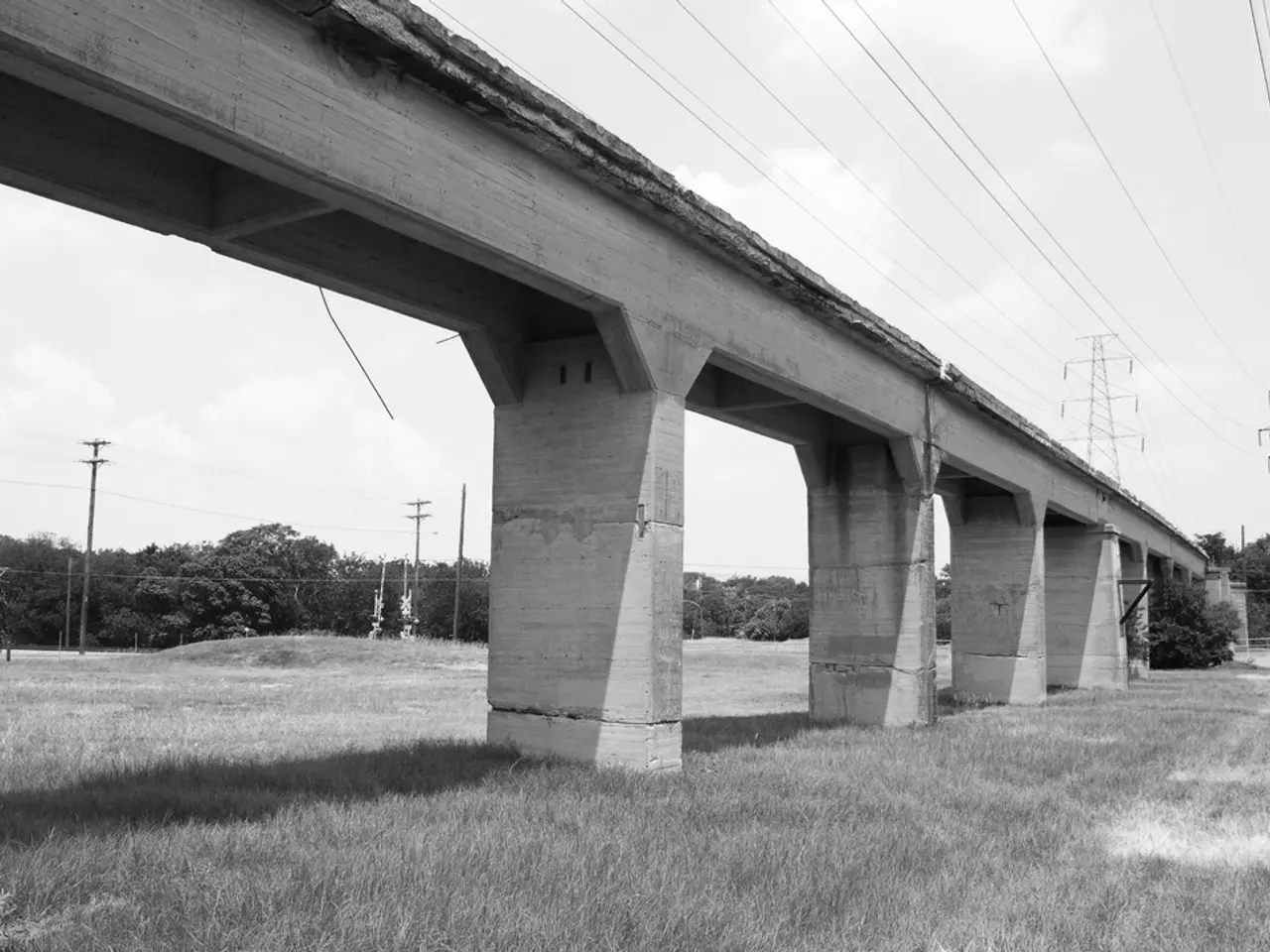Investigation into Adani Green: Explanation of the hybrid strategy that has piqued interest among investors
In the heart of Gujarat, Adani Green Energy Ltd (AGEL) is developing the world's largest renewable energy plant, the Khavda hybrid park. Spanning over 538 square kilometers, the park is set to reach a capacity of 30,000 MW, revolutionising India's energy landscape.
Currently, AGEL has operationalised about 2,824 MW of renewable capacity at Khavda, including solar, wind, and hybrid projects. Notable additions this year include a 50 MW solar-wind hybrid and a 187.5 MW solar project. The hybrid park integrates solar panels, wind turbines, smart control systems, and batteries, providing clean, on-demand power to address India's peak power needs without relying on coal.
AGEL's Khavda project is a significant contributor to India’s goal of 500 GW non-fossil fuel capacity by 2030. When fully complete, it will supply affordable clean energy capable of powering over 16 million homes, generating more than 15,200 green jobs, and avoiding approximately 58 million tonnes of CO2 emissions annually.
The project is a testament to AGEL's growth, with the company surpassing 15,000 MW of total installed renewable capacity across its portfolio. AGEL is leveraging its infrastructure expertise and partnerships to accelerate development, such as a 50:50 joint venture with TotalEnergies focused on managing a 1,150 MW solar portfolio within Khavda.
As India transitions from coal-based 24/7 power to clean energy, the hybrid model exemplified by the Khavda project is crucial. It demonstrates India's ability to reduce emissions and enhance grid stability while providing consistent power, akin to coal but without the smog.
AGEL is not limiting itself to renewable energy generation. The company is investing in battery storage, adding 5GW of hydro Pumped Storage Projects (PSP) capacity by 2030, and diversifying its portfolio to include energy storage solutions. AGEL has also won a 1250 MW of energy capacity storage from the Uttar Pradesh Power Corporation (UPPCL).
However, the financial side of battery storage remains unsteady in India. AGEL's hybrid assets are being positioned as feedstock energy for green hydrogen production via its affiliate Adani New Industries Ltd (ANIL). ANIL has announced plans to build 1 million metric tonnes of green hydrogen production capacity by 2030, with AGEL's hybrid parks supplying most of this energy.
Despite the challenges, AGEL's success is evident. The company sold 10,479 million units in Q1 FY26, a 42% increase from the previous year, driven by hybrid systems. AGEL's quick timelines and large-scale rollouts, however, come with significant investment risks, as large hybrid parks require massive investment.
In conclusion, AGEL’s Khavda hybrid renewable energy park is an ongoing flagship project, actively expanding capacity, exemplifying advanced hybrid renewable integration, and poised to play a transformative role in India's clean energy future. The success of this project will depend on the speed at which India's battery supply chain matures or on AGEL's ability to secure global supply deals at favourable terms.
- AGEL's Khavda hybrid renewable energy park, set to reach a capacity of 30,000 MW, is revolutionizing India's energy landscape and fostering the growth of the renewable market.
- With the completion of the Khavda project, AGEL will supply affordable clean energy capable of powering over 16 million homes, generating more than 15,200 green jobs, and reducing approximately 58 million tonnes of CO2 emissions annually.
- AGEL is not limiting itself to renewable energy generation, and is investing in battery storage, diversifying its portfolio to include energy storage solutions, and winning energy capacity storage from the Uttar Pradesh Power Corporation (UPPCL).
- AGEL's hybrid assets are being positioned as feedstock energy for green hydrogen production via its affiliate Adani New Industries Ltd (ANIL), which has plans to build 1 million metric tonnes of green hydrogen production capacity by 2030.
- AGEL's quick timelines and large-scale rollouts, however, come with significant investment risks, as large hybrid parks require massive investment, and the financial side of battery storage remains unsteady in India.
- In conclusion, the success of AGEL’s Khavda hybrid renewable energy park will depend on the speed at which India's battery supply chain matures or on AGEL's ability to secure global supply deals at favorable terms, potentially impacting the economy, technology, and lifestyle sectors, as well as sports and other aspects of society that rely on a stable energy supply.




